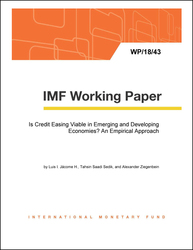
Is Credit Easing Viable in Emerging and Developing Economies? An Empirical Approach
During the global financial crisis, many central banks in advanced economies engaged in credit easing. These policies have been perceived as largely successful in reducing stress in financial markets, thus avoiding larger output losses. In this paper, we study empirically whether credit easing is also a viable policy tool to cope with banking crises in emerging and developing economies. We find that credit easing leads to a sharp increase in domestic currency depreciation, high inflation, and a substantial reduction in economic growth in a large panel of emerging and developing economies. For advanced economies, we find the effects to be benign. Our results suggest that emerging and developing economies should be cautious when using credit easing as it may fuel adverse macroeconomic repercussions.
Publication date: March 2018
ISBN: 9781484345160
$18.00
Add to Cart by clicking price of the language and format you'd like to purchase
Available Languages and Formats
| English |
Prices in red indicate formats that are not yet available but are forthcoming.
Topics covered in this book
This title contains information about the following subjects.
Click on a subject if you would like to see other titles with the same subjects.
credit easing , macroeconomic stability , Financial Markets and the Macroeconomy , Monetary Policy (Targets , Instruments , and Effects)
Summary
Copyright © 2010 - 2024
Powered by:
AIDC



